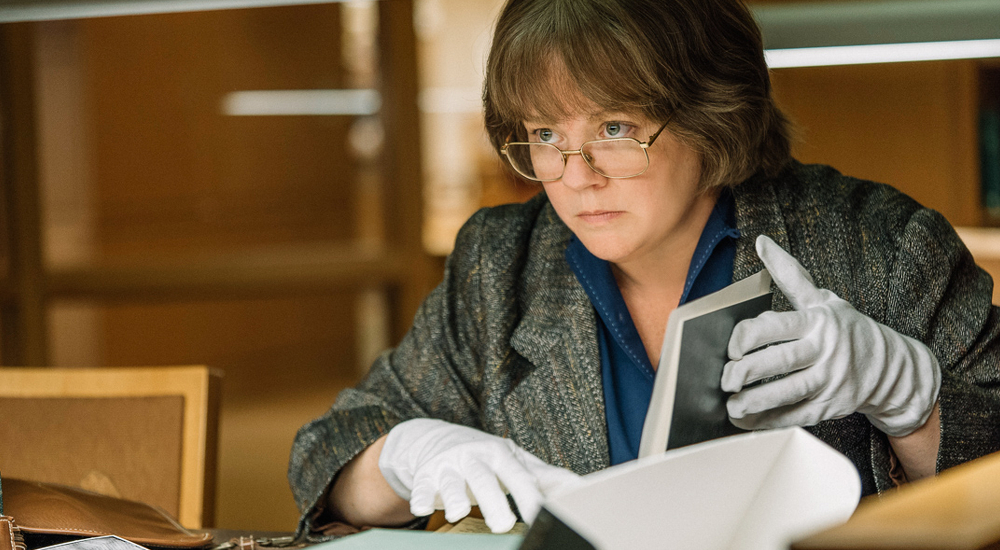“Should we settle up?”
Marielle Heller utilizes every ounce of talent from lead Melissa McCarthy, giving her the dramatic role of her career in the form of Lee Israel, a published biographer turned fraudulent autograph seller, in the extremely impressive Can You Ever Forgive Me?
Set in 1991, the film focuses in on author Lee Israel, a prominent biographer in the 60s, 70s, and 80s who now struggles to make ends meet due to her inability to keep up with the changing interests of the public. McCarthy soberly embodies the role of Israel, bringing forth a somber and melancholy woman who fears the best years of her life are behind her - and they might be. Her agent has no interest in her future projects, her girlfriend ended their long-term relationship and has moved on to someone new, and her apartment is becoming infested with flies.
All this sets the stage for Israel’s next move: forging autographs from some of the industry’s most prominent contributors and selling them to local bookstores in Manhattan.
Enlisting the help of Jack Holt (a beautifully enriching Richard E. Grant), an old acquaintance who was just released from prison, serving time for armed robbery, Lee transforms herself into the mind of the deceased industry heavyweights. From Katherine Hepburn and Edna Ferber to Dorothy Parker and Noël Coward, Israel casts a wide net, gravitating to where the demand rests to ensure a high dollar sale.
The film, in all its glory, deserves high marks for presenting Israel in a neutral light. Never placing her on a pedestal or damning her to the fiery pits of hell, Heller offers us a character that is painstakingly human. It seems somewhat ironic that a film centered around a lie would feature characters described as real, but with the combined efforts of Heller, McCarthy, and Grant that is what audiences get.
Though the film is considered a drama, you cannot deny the comedic undertones at play. Give McCarthy credit here. Though Lee is an alcoholic who has no real sense of place within her own life, McCarthy creates a small dose of fun as she sips at her cocktail and attempts to understand where it all went wrong. Alas, that question is never fully answered, and it's with good purpose: Lee’s messy life is the result of many contributing factors, none of which our anti-heroine is willing to address.
At the age of 51, Lee has trouble understanding a lot about her past. She struggles to comprehend how a woman of her talent can work hard and not make a living wage, and she is uninterested in playing the mainstream game, calling out Tom Clancy's ridiculous advance in the process. For every endearing quality that she shows there are three others that infuriate you. The balancing act is not an easy one; however, McCarthy makes it look that way. Her ability to give us a character that we loathe for and sympathize with is nothing short of impressive. The fact that she can make us all laugh in the process is merely a bonus.
McCarthy and Grant work well together, allowing their dialogue exchanges to flow freely as they navigate the legal and moral terrain associated with the forgeries. Lee, in a bit of satiric gold, is hypocritically sincere when she proclaims her need to “honor the written word” and “respects history” - two phrases that stir up a few laughs, but offer up a haunting look at the perspective that she is taking to the situation. Grant’s Jack is merely looking for something to do throughout the day, and his friend has a couch, a much more comfortable bed than the ground that has become his regular resting place.
It shouldn’t come as a surprise to learn that most great things must come to an end - including a forgery stint that operates in a community as small as this one. Though many have questioned the authenticity of Israel’s memoir that serves as the source material for the film’s script, that doesn’t matter here. Instead, viewers can relish in the simplistic dramatics that help to ground this otherwise unbelievable story. It is within this simplicity that Can You Ever Forgive Me? discovers its heart, soul, and to a certain degree its conscience.

